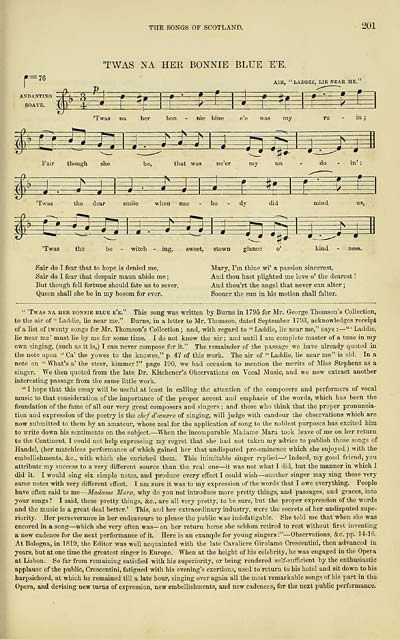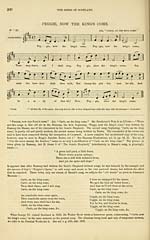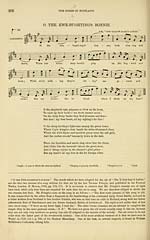Glen Collection of printed music > Printed music > Wood's edition of the songs of Scotland
(227) Page 201 - 'Twas na her bonnie blue e'e
Download files
Complete book:
Individual page:
Thumbnail gallery: Grid view | List view

TOE SONGS OF SCOTLAND.
201
'TWAS NA HER BONNIE BLUE E'E.
: 76
ANDANTINO
AIR, " LADDIE, ME NEAR ME.'
3
Me£ee*i
t=±=t
'Twas na her bon - nie blue e'e was my ru - in ;
^^^^ ^mm
#
as
Fair though
V
be, that was ne'er my un
*-
do - in'
IE
'Twas the dear smile when nae bo - dy
did
mind us.
^
&
^
P^=
-> — i— -j
^p^^i
*=#
'Twas
the
be
ff
witch - ing, sweet, stown glance o'
kind - ness.
Sair do I fear that to hope is denied me,
Sair do I fear that despair maun abide me ;
But though fell fortune should fate us to sever,
Queen shall she be in my bosom for ever.
Mary, I'm thine wi' a passion sincerest,
And thou hast plighted me love o' the dearest !
And thou'rt the angel that never can alter ;
Sooner the sun in his motion shall falter.
" 'Twas na her bonnie blue e'e." This song was written by Burns in 1795 for Mr. George Thomson's Collection,
to the air of " Laddie, lie near me." Burns, in a letter to Mr. Thomson, dated September 1793, acknowledges receipt
of a list of twenty songs for Mr. Thomson's Collection ; and, with regard to " Laddie, lie near me," says : — " ' Laddie,
lie near me' must lie by me for some time. I do not know the air ; and until I am complete master of a tune in my
own singing, (such as it is,) I can never compose for it." The remainder of the passage we have already quoted in
the note upon " Ca' the yowes to the knowes," p. 47 of this work. The air of " Laddie, lie near me" is old. In a
note on " What's a' the steer, kimmer ?" page 190, we had occasion to mention the merits of Miss Stephens as a
singer. We then quoted from the late Dr. Kitchener's Observations on Vocal Music, and we now extract another
interesting passage from the same little work.
" I hope that this essay will be useful at least in calling the attention of the composers and performers of vocal
music to that consideration of the importance of the proper accent and emphasis of the words, which has been the
foundation of the fame of all our very great composers and singers ; and those who think that the proper pronuncia-
tion and expression of the poetry is the chef d'ceuvre of singing, will judge with candour the observations which are
now submitted to them by an amateur, whose zeal for the application of song to the noblest purposes has excited him
to write down his sentiments on the subject. — When the incomparable Madame Mara took leave of me on her return
to the Continent, I could not help expressing my regret that she had not taken my advice to publish those songs of
Handel, (her matchless performance of which gained her that undisputed pre-eminence which she enjoyed,) with the
embellishments, &c, with which she enriched them. This inimitable singer replied — ' Indeed, my good friend, you
attribute my success to a very different source than the real one — it was not what I did, but the manner in which I
did it. I would sing six simple notes, and produce every effect I could wish — another singer may sing those very
same notes with very different effect. I am sure it was to my expression of the words that I owe everything. People
have often said to me — Madame Mara, why do you not introduce more pretty things, and passages, and graces, into
your songs ? I said, these pretty things, &c, are all very pretty, to be sure, but the proper expression of the words
and the music is a great deal better.' This, and her extraordinary industry, were the secrets of her undisputed supe-
riority. Her perseverance in her endeavours to please the public was indefatigable. She told me that when she was
encored in a song — which she very often was— on her return home she seldom retired to rest without first inventing
a new cadence for the next performance of it. Here is an example for young singers !" — Observations, &c. pp. 14-16.
At Bologna, in 1819, the Editor was well acquainted with the late Cavaliere Girolamo Crescentini, then advanced in
years, but at one time the greatest singer in Europe. When at the height of his celebrity, he was engaged in the Opera
at Lisbon. So far from remaining satisfied with his superiority, or being rendered self-sufficient by the enthusiastic
applause of the public, Crescentini, fatigued with his evening's exertions, used to return to his hotel and sit down to his
harpsichord, at which he remained till a late hour, singing over again all the most remarkable songs of his part in the
Opera, and devising new turns of expression, new embellishments, and new cadences, for the next public performance.
201
'TWAS NA HER BONNIE BLUE E'E.
: 76
ANDANTINO
AIR, " LADDIE, ME NEAR ME.'
3
Me£ee*i
t=±=t
'Twas na her bon - nie blue e'e was my ru - in ;
^^^^ ^mm
#
as
Fair though
V
be, that was ne'er my un
*-
do - in'
IE
'Twas the dear smile when nae bo - dy
did
mind us.
^
&
^
P^=
-> — i— -j
^p^^i
*=#
'Twas
the
be
ff
witch - ing, sweet, stown glance o'
kind - ness.
Sair do I fear that to hope is denied me,
Sair do I fear that despair maun abide me ;
But though fell fortune should fate us to sever,
Queen shall she be in my bosom for ever.
Mary, I'm thine wi' a passion sincerest,
And thou hast plighted me love o' the dearest !
And thou'rt the angel that never can alter ;
Sooner the sun in his motion shall falter.
" 'Twas na her bonnie blue e'e." This song was written by Burns in 1795 for Mr. George Thomson's Collection,
to the air of " Laddie, lie near me." Burns, in a letter to Mr. Thomson, dated September 1793, acknowledges receipt
of a list of twenty songs for Mr. Thomson's Collection ; and, with regard to " Laddie, lie near me," says : — " ' Laddie,
lie near me' must lie by me for some time. I do not know the air ; and until I am complete master of a tune in my
own singing, (such as it is,) I can never compose for it." The remainder of the passage we have already quoted in
the note upon " Ca' the yowes to the knowes," p. 47 of this work. The air of " Laddie, lie near me" is old. In a
note on " What's a' the steer, kimmer ?" page 190, we had occasion to mention the merits of Miss Stephens as a
singer. We then quoted from the late Dr. Kitchener's Observations on Vocal Music, and we now extract another
interesting passage from the same little work.
" I hope that this essay will be useful at least in calling the attention of the composers and performers of vocal
music to that consideration of the importance of the proper accent and emphasis of the words, which has been the
foundation of the fame of all our very great composers and singers ; and those who think that the proper pronuncia-
tion and expression of the poetry is the chef d'ceuvre of singing, will judge with candour the observations which are
now submitted to them by an amateur, whose zeal for the application of song to the noblest purposes has excited him
to write down his sentiments on the subject. — When the incomparable Madame Mara took leave of me on her return
to the Continent, I could not help expressing my regret that she had not taken my advice to publish those songs of
Handel, (her matchless performance of which gained her that undisputed pre-eminence which she enjoyed,) with the
embellishments, &c, with which she enriched them. This inimitable singer replied — ' Indeed, my good friend, you
attribute my success to a very different source than the real one — it was not what I did, but the manner in which I
did it. I would sing six simple notes, and produce every effect I could wish — another singer may sing those very
same notes with very different effect. I am sure it was to my expression of the words that I owe everything. People
have often said to me — Madame Mara, why do you not introduce more pretty things, and passages, and graces, into
your songs ? I said, these pretty things, &c, are all very pretty, to be sure, but the proper expression of the words
and the music is a great deal better.' This, and her extraordinary industry, were the secrets of her undisputed supe-
riority. Her perseverance in her endeavours to please the public was indefatigable. She told me that when she was
encored in a song — which she very often was— on her return home she seldom retired to rest without first inventing
a new cadence for the next performance of it. Here is an example for young singers !" — Observations, &c. pp. 14-16.
At Bologna, in 1819, the Editor was well acquainted with the late Cavaliere Girolamo Crescentini, then advanced in
years, but at one time the greatest singer in Europe. When at the height of his celebrity, he was engaged in the Opera
at Lisbon. So far from remaining satisfied with his superiority, or being rendered self-sufficient by the enthusiastic
applause of the public, Crescentini, fatigued with his evening's exertions, used to return to his hotel and sit down to his
harpsichord, at which he remained till a late hour, singing over again all the most remarkable songs of his part in the
Opera, and devising new turns of expression, new embellishments, and new cadences, for the next public performance.
Set display mode to: Large image | Transcription
Images and transcriptions on this page, including medium image downloads, may be used under the Creative Commons Attribution 4.0 International Licence unless otherwise stated. ![]()
| Special collections of printed music > Glen Collection of printed music > Printed music > Wood's edition of the songs of Scotland > (227) Page 201 - 'Twas na her bonnie blue e'e |
|---|
| Permanent URL | https://digital.nls.uk/91340467 |
|---|
| Description | Scottish songs and music of the 18th and early 19th centuries, including music for the Highland bagpipe. These are selected items from the collection of John Glen (1833 to 1904). Also includes a few manuscripts, some treatises, and other books on the subject. |
|---|
| Description | The Glen Collection and the Inglis Collection represent mainly 18th and 19th century Scottish music, including Scottish songs. The collections of Berlioz and Verdi collected by bibliographer Cecil Hopkinson contain contemporary and later editions of the works of the two composers Berlioz and Verdi. |
|---|

